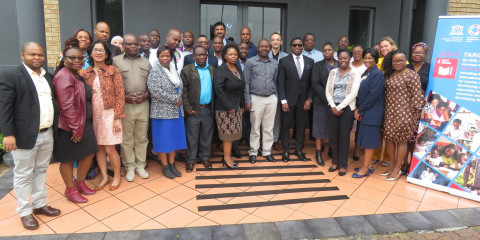
GCED Basic Search Form
Quick Search
You are here
News

Nine countries covered by the UNESCO Regional Office for Southern Africa (ROSA) met in Johannesburg, South Africa from 9 to 11 December 2019 to review implementation of Sustainable Development Goal 4 (SDG 4).
40 representatives from Ministries of education’s education management information systems (EMIS), planning, and coordination units from Botswana, Eswatini, Lesotho, Malawi, Mozambique, Namibia, South Africa, Zambia and Zimbabwe attended the three-day working session that focused on monitoring and coordinating the implementation of SDG4, whose targets reach far beyond the improvement of access envisaged through Education For All, to considerations of equity, quality and relevance of education.
Since 2015, a key challenge to the development of country implementation plans for SDG4 has been the integration, alignment and coordination of SDG4 indicators with the strategy and indicators of SADC’s regional industrialisation strategy, as well as with individual country initiatives, policies, plans and national development indicators. Internal coordination and alignment between individual country Ministries and departments is also a challenge.
Presentations by UNESCO and SADC colleagues provided background information and guidance on the structure of SDG4 and its targets and sub-targets, how these relate to the more recent Continental Education Strategy for Africa (CESA), and achievements and challenges experienced to date. Countries reported their progress in implementation, and challenges experienced in monitoring their achievements.
Implementation modalities were discussed, with individual countries, particularly Botswana, demonstrating how they aligned national and regional policies into comprehensive SDG4 implementation plans.
South Africa appreciated the role UNESCO is playing, especially in building capacity in the member states by bringing them together to share best practices.
Through groupwork sessions, participants identified their countries’ key legislation and policy frameworks related to SDG4 and CESA, and corresponding gaps; as well as coordinating mechanisms operating in individual countries, where institutionalisation of SDG4 and CESA processes were generally found to need strengthening, advocacy and awareness.
A presentation on the data landscape from the perspective of the Namibian education sector explained some of the processes, gaps and challenges in this area, which was the third main axis of the workshop. The lively discussion on data processes, quality and challenges reflected the primacy of this interest among the delegates, with observations that country internal colleagues from other departments do not necessarily have equivalent capacity. Technological possibilities for obtaining real time data were held up as an ideal, with recommendations for innovative strategies for use in underdeveloped and rural contexts.
For more information, please contact: J.Heiss@unesco.org
URL:
https://en.unesco.org/news/rosa-countries-review-sdg-4-implementation
